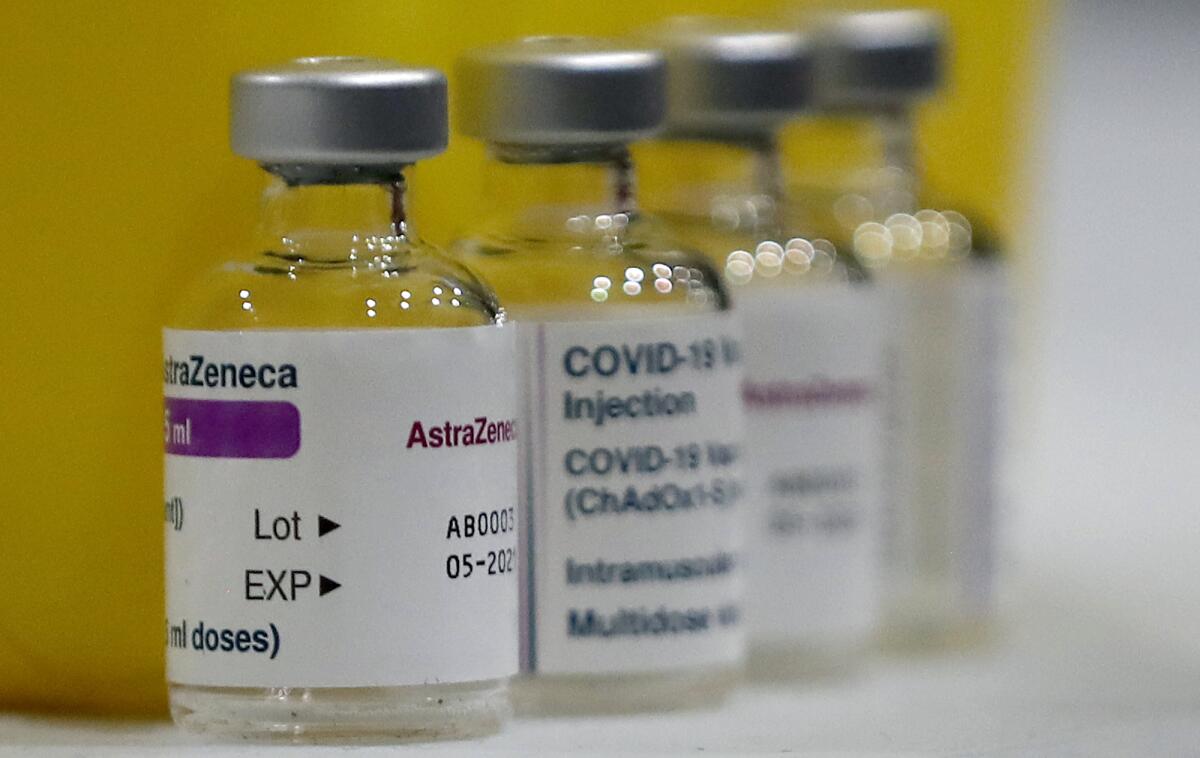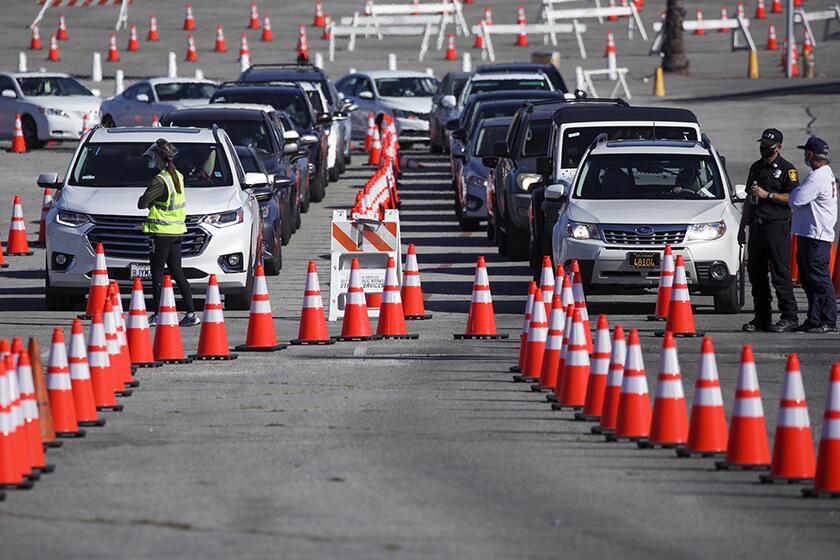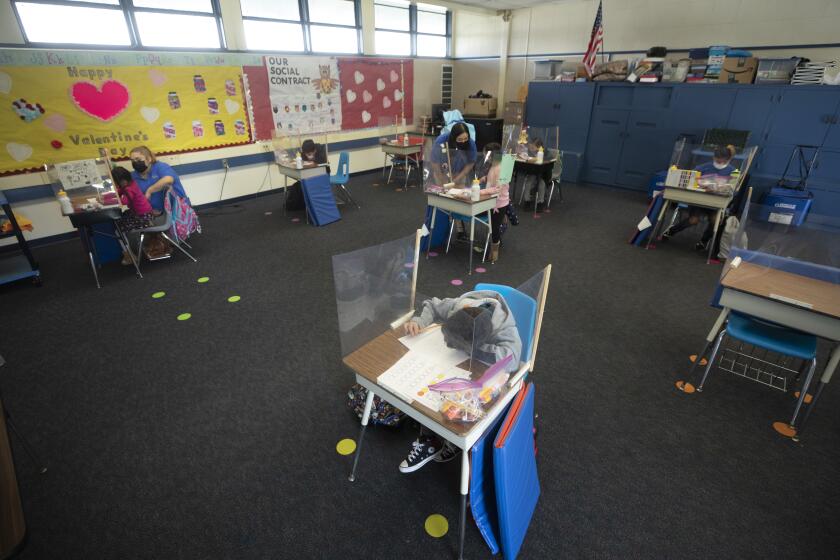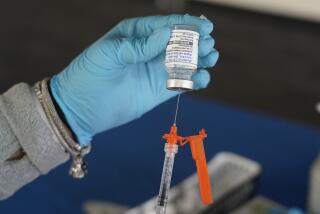Study finds AstraZeneca COVID-19 vaccine may reduce virus transmission

- Share via
AstraZeneca’s COVID-19 vaccine does more than prevent people from falling seriously ill — it appears to reduce transmission of the coronavirus and offers strong protection for three months on just a single dose, researchers said Wednesday in an encouraging turn in the campaign to suppress the outbreak.
The preliminary findings from Oxford University, a co-developer of the vaccine, could vindicate the British government’s controversial strategy of delaying the second shot for up to 12 weeks so that more people can be quickly given a first dose. Up to now, the recommended time between doses has been four weeks.
The research could also bring scientists closer to an answer to one of the big questions about the vaccination drive: Will the vaccines actually curb the spread of the coronavirus?
It’s unclear what implications, if any, the findings might have for the two other major vaccines being used in the West, Pfizer’s and Moderna’s.
Dr. Anthony Fauci, the United States’ top infectious disease expert, dismissed the idea of deliberately delaying second shots, saying the U.S. will “go by the science” and data from the clinical trials. The two doses of the Pfizer and Moderna vaccines are supposed to be given three and four weeks apart, respectively.
Still, the research appears to be good news in the desperate effort to arrest the spread of the virus and also suggests a way to ease vaccine shortages and get shots into more arms more quickly.
The sites will be run by the federal government. One will be at Cal State Los Angeles, the other at the Oakland Coliseum.
The makers of all three vaccines have said that their shots proved to be 70% to 95% effective in clinical trials in protecting people from illness caused by the virus. But it was unclear whether the vaccines could also suppress transmission of the virus — that is, whether someone inoculated could still acquire the virus without getting sick and spread it to others.
As a result, experts have been saying that even people who have been vaccinated should continue to wear masks and keep their distance from others.
Oxford’s study, however, found that the vaccine not only prevented severe disease but also appeared to cut transmission of the virus by two-thirds. The study has not been peer-reviewed yet.
Volunteers in the study underwent regular nasal swabs. The level of virus-positive swabs — from both those who had COVID-19 symptoms and those who had none — was 67% lower in the vaccinated group.
“That’s got to have a really beneficial effect on transmission,” Oxford lead researcher Sarah Gilbert said at a meeting of the New York Academy of Sciences.
The researchers also looked at how likely people who have been vaccinated are to get a symptom-free infection. In one subset of volunteers, there were 16 asymptomatic infections among the vaccinated and 31 in an unvaccinated comparison group.
Pfizer and Moderna also are studying the effect of their vaccines on asymptomatic infections.
Only the Pfizer and Moderna vaccines are being used in the United States. Britain is using both AstraZeneca’s and Pfizer’s. AstraZeneca’s has also been authorized by the 27-nation European Union. Pfizer has not endorsed the British government’s decision to lengthen the time between doses.
Gov. Gavin Newsom said he believes California’s educators can return to their classrooms provided proper safety measures and supports are in place
Meanwhile, a United Nations-backed program to supply COVID-19 vaccines to the neediest people worldwide is gearing up after a troubled start. The COVAX Facility announced plans Wednesday for an initial distribution of about 100 million doses by the end of March and more than 200 million more by the end of June to dozens of countries.
Nearly all of the doses expected for the first phase are due to come from AstraZeneca and its partner, the Serum Institute of India. The rollout will be contingent on the World Health Organization authorizing the AstraZeneca shot for emergency use, which is expected to happen this month.
About 190 countries and territories are participating in COVAX, which has seen wealthy nations scoop up vaccine supplies, sometimes at premium prices.
The pandemic’s worldwide death toll has surpassed 2.2 million, including more than 450,000 in the U.S., according to Johns Hopkins University data.
New cases per day in the U.S. and the number of Americans in the hospital with COVID-19 have dropped sharply in the last few weeks, but the death rate is still running at close to all-time highs at an average of about 3,100 a day. Fatalities often lag behind the infection curve, because it can take weeks to sicken and die of COVID-19.
As the Super Bowl approaches, Fauci is warning people against inviting others over for game day parties, urging viewers to “just lay low and cool it” to avoid turning Sunday’s big game into a superspreader event.
“You don’t want parties with people that you haven’t had much contact with,” he told NBC’s “Today” show. “You just don’t know if they’re infected.”







